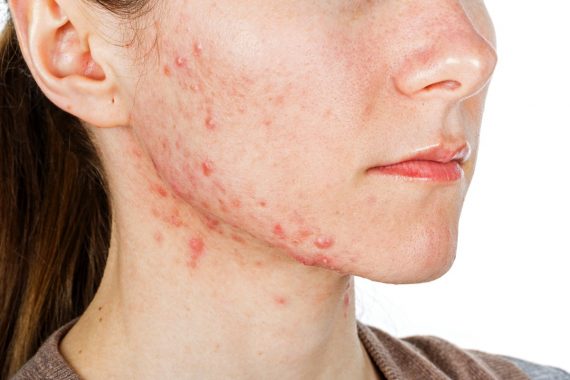The first ever NICE guideline for acne vulgaris recommends GPs to consider mental health support for patients who are severely affected.
The final guideline, published today, recommends pharmacological and photodynamic therapies for the majority of people with acne, but also emphasises the importance of supporting the mental health of patients experiencing significant psychological distress as a result.
GPs should consider referral to mental health services where appropriate, the guideline says, especially for patients with a current or past history of severe depression or anxiety; body dysmorphic disorder; or suicidal ideation and self-harm.
Around 3% of adults suffer acne beyond the age of 35 and is, in some cases, a genetic condition that runs in families, NICE said.
The new NICE guidance also includes advise on skin care, including avoiding oil-based creams and make-up; and diet, stating there is ‘not enough evidence’ to recommend diet changes.
It also sets out when patients should be referred to a specialist dermatologist, including when there is diagnostic uncertainty about their acne; they have acne conglobata; or they have nodulo-cystic acne.
NICE director of the Centre for Guidelines Dr Paul Chrisp said: ‘Acne affects most of us at some point in our lives, and while it is usually limited to a few facial spots in our teenage years, for some people it is more severe and can impact on their self-esteem and mental health. Not everyone with acne will experience high levels of psychological distress, but it’s important that we find ways to support those who do.
‘With this new guideline it is our hope that people whose acne affects their everyday lives are offered the support they need to treat the condition, both physically and mentally.’
British Association of Dermatologists’ Therapy & Guidelines Sub-Committee chair Professor Nick Levell said: ‘It is great that NICE has chosen to work with the British Association of Dermatologists which has co-badged these evidence-based guidelines to help people who are suffering with acne.
‘We all hope that this will improve care for adults and children, help reduce resistance to antibiotics, highlight areas where further research is needed and provide guidance to all those involved in looking after people with this distressing condition.’
Acne vulgaris: management [Mental health section in full]
Consider referral to mental health services if a person with acne experiences significant psychological distress or a mental health disorder, including those with a current or past history of:
- suicidal ideation or self-harm
- a severe depressive or anxiety disorder
- body dysmorphic disorder.
When considering referral, take into account the person’s potential treatment options (for example, oral isotretinoin). Also see the NICE guidelines on depression in children and young people: identification and management for advice on recognition, depression in adults: recognition and management for advice on recognition and assessment, and self-harm in over 8s: long-term management for advice on self-harm.
Source: NICE
Pulse October survey
Take our July 2025 survey to potentially win £1.000 worth of tokens
















You have a cosmetic industry worth over £27 billion pounds. And a marketing, airbrushed, alcoholic and party world that couldn’t care less.
Well Matt Hugecock had a grope in May so that means the pandemic is now fully over and Mental Health Services are fully funded and cope with everything.
Never took any notice of N.I.C.E.——-don’t intend to start now
Given that mental health services don’t have the capacity to see anyone unless they’re acutely suicidal or psychotic, I very much doubt they’ll see someone with spots. Who writes these ridiculous guidelines?
We used to build ships…
To the Scottish GPs amongst you, What is the point of building ships without a Helen to launch them?
The main criteria for CMHT support is at least a succesful suicide attempt. – anyone else only merits commencing an addictive antipsychotic that will cause weight gain and acne…….. and they don;t aulify for support because they have ben discharged….
Make sure they know that if they are too sad they don’t get roaccutane.
On a lighter note—-now that Wimbledon is upon us——-remember you are more likely to get a seat on the centre court than get a locum
David, suspect ‘successful suicide attempts” best dealt with by pathology, not psychology 😁
I don’t think that was a typo Scottish GP.
Around here a failed suicide attempt doesn’t seem to be enough.
Mr. Marvellous——agreed